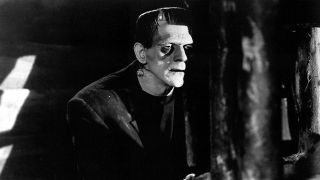"I busied myself to think of a story which would speak to the mysterious fears of our nature and awaken thrilling horror; one to make the reader dread to look around, to curdle the blood, and quicken the beatings of the heart," Mary Shelley once wrote as explanation for why she penned Frankenstein.
The mysterious fears, thrilling horror and blood-curdling dread she speaks of continues some 200 years after the novel was first published. Movies, TV shows and novels take inspiration from her cautionary resurrection tale. Some remain in the realm of unspeakable horror, others take different routes in exploring the ventures of a scientist who couldn't let the dead stay buried. Here's fifteen of the best.
15. Frankenhooker (1990)
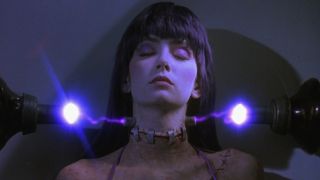
The Frankenstein movie: Ever since Shelley's tome hit the shelves one question has plagued literary academics and cinematic scholars: what if Frankenstein's monster went on the game? Wonder no more! Frankenhooker riffs on that very possibility.
Frank Henenlotter notched up some serious horror cred with Basket Case, and brings that same disturbed and sardonic eye to a truly unique perspective on Frankenstein's creation: it consists of dead hookers. And that's not all! Its creator Jeffrey adds a touch of personal flair by affixing the severed head of his girlfriend, who is killed early on in a hideous lawnmower accident. Frankenhooker's subsequent rampage across New York City is sterling B-movie schlock.
Monstrous moment: Jeffrey's plan to acquire the necessary corpses takes a turn when a group of prostitutes scarf down a bag of laced crack that causes them to explode. He still collects their dismembered remains anyway. Waste not, want not.
14. Flesh for Frankenstein (1973)
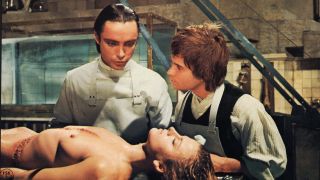
The Frankenstein movie: This esoteric slice of psychosexual comedy also goes by the name Andy Warhol's Frankenstein. Like the monsters at its heart, it's a strange creature that takes the essence of the Frankenstein story and repurposes it as a morality tale. Arriving at a time when the era of free love was reaching the end of its reign, director Paul Morrissey attaches many social comments to the tale. What are the consequences of freedom?
For his scientist (played by Udo Kier), sexual freedom spawns an incestuous union with his sister, which itself spawns two children. Later this infects his work as he creates two monsters, one male, one female, in order for them to satisfy each other and the married siblings. It's nuttier than a fruitcake.
Monstrous moment: Sick of being bossed about, the male creation refuses to satisfy the Baroness' sexual appetite. He chooses to kill her instead.
13. Mary Shelley's Frankenstein (1994)
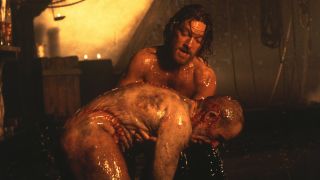
The Frankenstein movie: Kenneth Branagh assembled a killer cast for his underrated 1994 adaptation, including Robert De Niro, Ian Holm, Helena Bonham Carter, Richard Briers, John Cleese and Aidan Quinn to name but a few. And of all the versions of Shelley's tale to reach the screen, this is perhaps the most loyal adaptation of them all.
Branagh stars as the feverish scientist Victor Frankenstein who refuses to be torn away from his work, an ego-driven creator desperate to conquer the fate which awaits us all. While he, and indeed the entire supporting cast, is superb it's De Niro and his subtle layering of the Monster's id that warrant applause. He's not a towering goon; he's a real person. And, like any human, he's desires both dark and light.
Monstrous moment: The Monster does get up to some pretty atrocious stuff, and you can't really blame him considering his maker's insensitivity. Murdering Victor's new bride to teach him a lesson is downright evil.
12. The Spirit of the Beehive (1973)
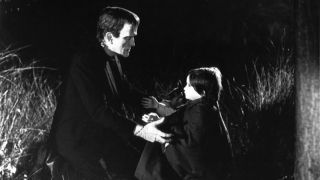
The Frankenstein movie: Staking a claim in the meta canon is Victor Erice's sixties drama. It's a sweet tale that's ripe with symbolism toward the dwindling Francoist regime. It starts when a ramshackle picturehouse in a small Spanish town receives a print of James Whale's Frankenstein. Two sisters, Ana and Isabel, watch wide-eyed.
Their story is one with which many film fans can relate. That desire for the strange and wonderful things we see on the big screen to be made real. When the siblings venture to an old sheep pen, Isabel tells her sister this is the Monster's home. Shortly after an escaped convict arrives and Ana takes care of him, sneaking him clothes and food. For Ana, her fascination stems from a genuine interest in the Monster's purpose: what does he want?
Monstrous moment: Against her father's advice, Ana eats a poisonous mushroom and hallucinates the Monster.
11. The Revenge of Frankenstein (1958)

The Frankenstein movie: This dropped as part of Hammer's wave of stellar Frankenstein pictures, a seven-movie tenure that brought several superb continuations of the Baron's story.
Revenge picks up directly where its predecessor left off, with Victor Frankenstein about to get beheaded as penance for the crimes committed by his Monster. He's not decapitated, and escapes to Germany where he sets up at a pauper hospital to carry out more experiments. Peter Cushing gets Victor's divided mindset spot-on: he's compelled to create a perfect vessel for his assistant Karl, thinking nothing of stealing body parts from his patients. That odd dichotomy of wishing to preserve life and willingness to destroy it, two of his biggest conflicts.
Monstrous moment: Karl's little rampage as he escapes Victor's attic is up there. He murders two people who mistake him for a thief.
10. Frankenweenie (2012)
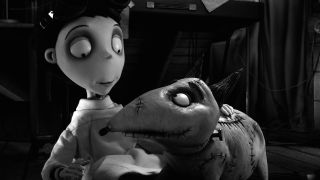
The Frankenstein movie: Tim Burton's stop-motion movie originally started life as a live-action 1984 short film. Both captured the essence of Shelley's creation, turned the terrifying monster normally lumbering about into a sweet, loveable pet.
Burton takes certain iconic elements of the Frankenstein mythology and plays around with them to fit the tale of a young spirited boy named Victor. Like the original scientist Victor brings his beloved dog Sparky back from the dead using the power of an electrical storm. Unlike the majority of titles that pluck from Shelley's resurrection yarn, Sparky doesn't seek revenge on his owner.
Monstrous moment: Victor's classmates steal his reanimation formula, bringing forth a horde of pet-monsters. Mr. Whiskers becomes fused with a bat and comes to as a bloodthirsty fanged feline and Edgar transforms a dead rat into a werewolf rodent.
9. Frankenstein (1910)
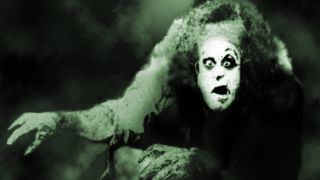
The Frankenstein movie: Thomas Edison's Bronx studio first brought Shelley's story to Hollywood's attention with one big difference. Feeling the pressure to craft a thoughtful, provocative film, Edison removed all of the horror from the script in order to present a different take on the Monster.
The studio's press release outlines the decision to excise "actual repulsive situations" and concentrate instead on the "mystic and psychological problems" besieging the creature. The resultant silent film is unusual to say the least. As part of the Frankenstein canon it marks a deliberate departure from Shelley's intentions, that has never been attempted since. A must-see for completionists who will be intrigued by the choices Edison made.
Monstrous moment: The Monster spies its ghastly self in the mirror and flees in terror, only to disappear once Frankenstein wills him to. That's never happened before. Or since.
8. Frankenstein: The True Story (1973)
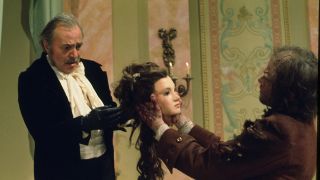
The Frankenstein movie: With gothic horror fully established by the early seventies, it was time for Frankenstein's tale to hit the small screen. This adventurous 1973 two-part TV movie includes a cast that you probably wouldn't expect: Leonard Whiting stars as Victor Frankenstein, along with Jane Seymour, David Mason, Agnes Moorehead and Ralph Richardson.
Scripted by Christopher Isherwood it takes liberties with the source material and even infuses certain parts created in earlier films. Changing Frankenstein into a weak-willed man who bows to the scientific aggressions of Clerval and Dr. Polidori (written specifically for the film), its most daring choice.
Monstrous moment: Awaking from hypnosis, a generous attempt at remedying its repulsive visage, the Monster lobs a laboratory attendant into a vat of acid.
7. Gods and Monsters (1998)

The Frankenstein movie: Christopher Bram's book Father of Frankenstein provides the basis for the film, which is a quasi-biopic of James Whale, who directed the 1931 version of Frankenstein.
This fictionalised account of his life experiences takes place as Whale is recovering from a stroke in his later years. Gaps in his past are filled in by throwbacks to his time during the First World War, and production on Bride of Frankenstein. Ian McKellen won much acclaim for his portrayal of a closeted man, conflicted by his joy for life and his struggle to be true to his own desires. The parallels between he and the Monster are no coincidence.
Monstrous moment: Whale's heartbreak when attending a public celebration; to the world his works are now classed as "ancient."
